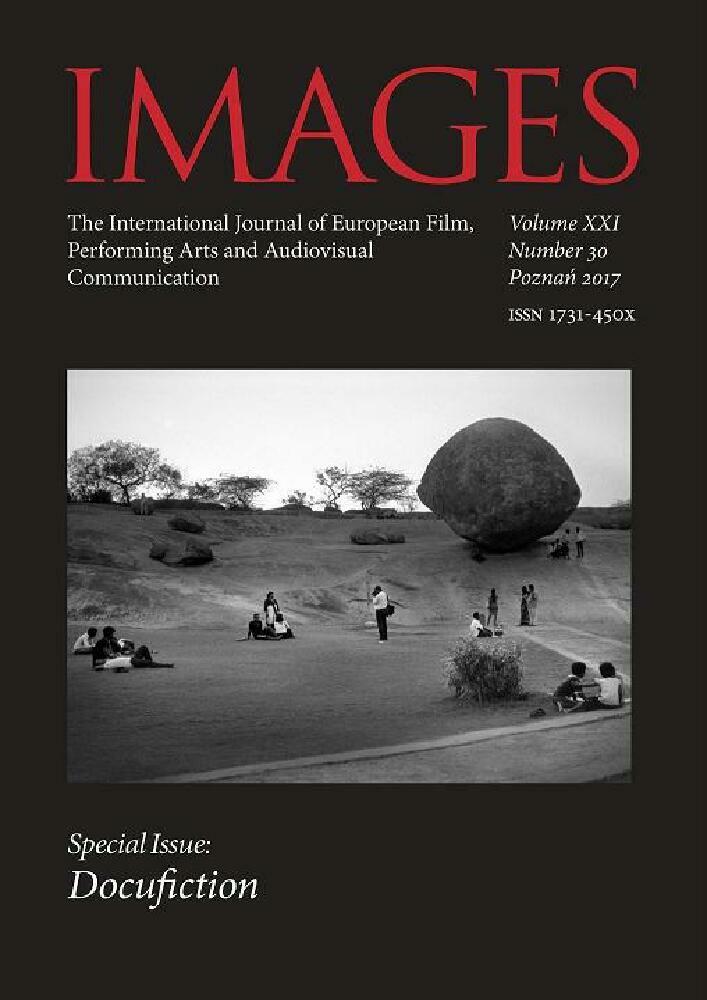Abstract
The article describes certain changes that have taken place over the last several years in the temporal perspective found in documentary films. Humanity’s current technological and media environment are influencing the documentary’s content and means of expression. They express a “universal present”, as Mirosław Przylipiak has pointed out, under the influence of television, and the former dominance of statements addressed to the camera gave way to looks into the past. At present, the documentary is once again shifting its orientation toward a strictly defined and changing form of the present. Time in the temporally non-linear works commonly found among contemporary documentaries has become fragmented and individualized. There is also a tendency in non-fiction works to strive for immersion – focusing on the experience of time rather than the telling of a story.References
Banasiak B., Nomadologia Gillesa Deleuze’a, „Hybris. Internetowy magazyn filozoficzny” 2001, nr 1, <http://magazynhybris.com/images/teksty/01/Bogdan%20Banasiak%20%20Nomadologia%20Gillesa%20Deleuze%60a.pdf> [dostęp: 25.05.2017]
Bazin A., Na marginesie Dlaczego walczymy, w: A. Bazin, Film i rzeczywistość, Warszawa 1963
Bławut J., Bohater w filmie dokumentalnym. Koncepcja autorska, Łódź 2010
Deleuze G., Kino. 1. Obraz-ruch. 2. Obraz-czas, tłum. J. Margański, Gdańsk 2008
Deleuze G., Guattari F., Wprowadzenie – Kłącze, w: G. Deleuze, F. Guattari, Tysiąc plateau, Warszawa 2015
Mukařovský J., Czas w filmie, przeł. Cz. Dondziłło, w: Estetyka i film, red. A. Helman, Warszawa 1972
Przylipiak M., „Gadające głowy” w filmie dokumentalnym, „Zeszyty Telewizyjne” 2004, nr 4
Przylipiak M., Poetyka filmu dokumentalnego, Gdańsk 2000
Tercz J., Pojęcie obrazu w teorii kina Gillesa Deleuze’a, poprawiona wersja referatu wygłoszonego na konferencji „Wymiary czasu” odbywającej się w dniach 11–12 grudnia 2009 w Krakowie, <https://www.academia.edu/3751878/Poj%C4%99cie_obrazu_w_teorii_kina_Gillesa_Deleuze_a> [dostęp: 7.04.2017]
Verwoert J., Zobaczyć to, co widać – o sposobie pracy Haruna Farockiego, tłum. K. Remin, w: Harun Farocki pierwszy raz w Warszawie, red. A Pękala, Warszawa (katalog wystawy Farockiego w CSW w Zamku Ujazdowskim, która odbyła się w 2012 roku)
Days in Egipt, reż. Jigar Mehta, USA 2011, <http://beta.18daysinegypt.com>
Deep Play, Harun Farocki, instalacja wielokanałowa, kolor, dźwięk, 12 ścieżek po 2 godziny 15 minut (pętla), 2007
Everyday Rebellion, reż. Arash T. Riahi i Arman T. Riahi, Austria/Szwajcaria/Niemcy/Grecja/Belgia 2013
Plac Tahrir – 18 dni niedokończonej rewolucji / In Tahrir Square: 18 of Egypt’s Unfinished Revolution, reż. Jon Alpert, Matthew O’Neill, USA 2011
Tahrir – Plac Wolnosci / Tahrir, reż. Stefano Savona, Francja / Włochy 2011
Powrót na plac Tahrir / Back to the Square, reż. Petr Lom, Torstein Grude, Grecja/Norwegia 2012
The Square / Al Midan, reż. Jehane Noujaim, Egipt / USA 2013
Art War, reż. Marco Wilms, Niemcy 2014
License

This work is licensed under a Creative Commons Attribution-NonCommercial-NoDerivatives 4.0 International License.
